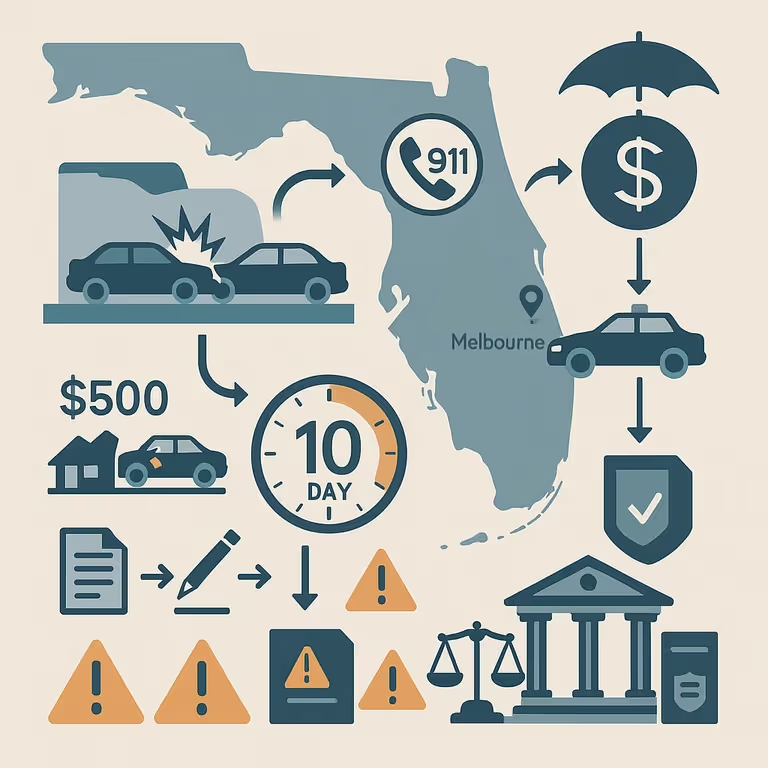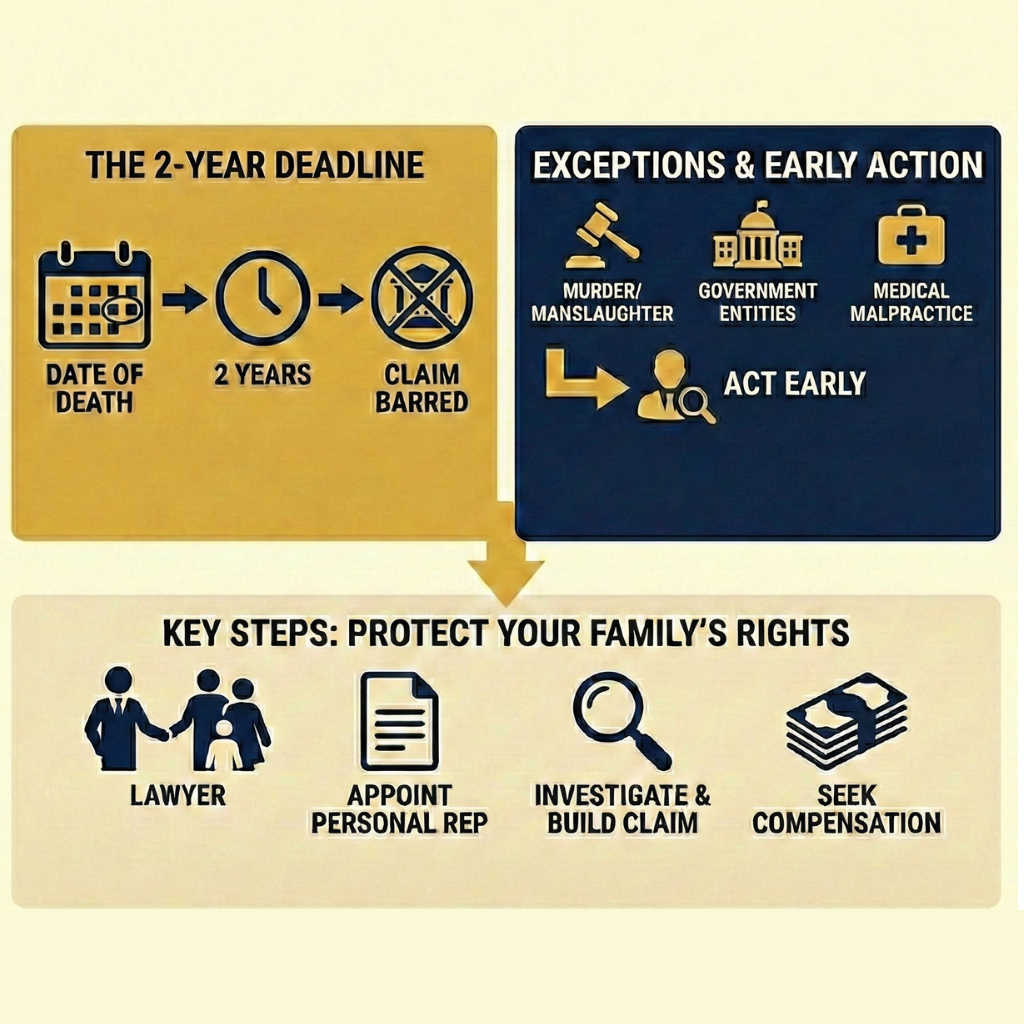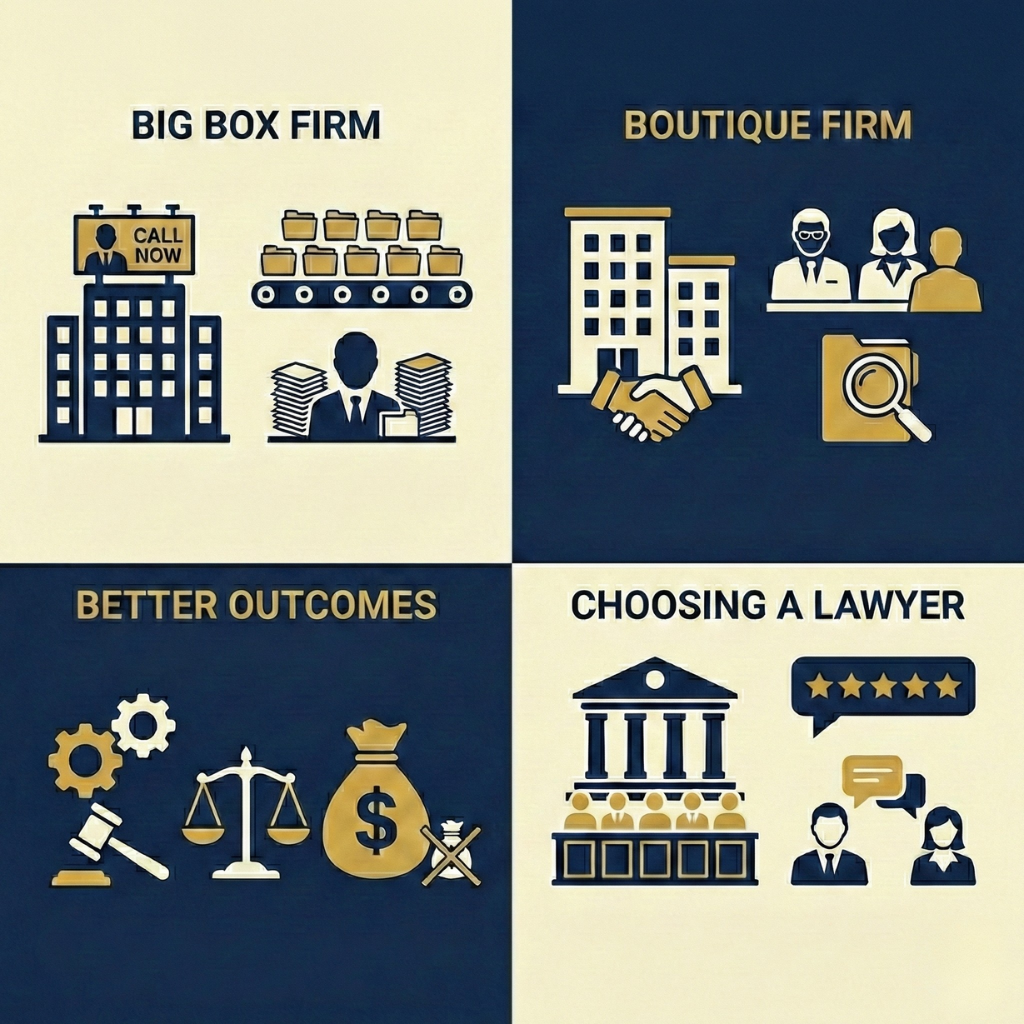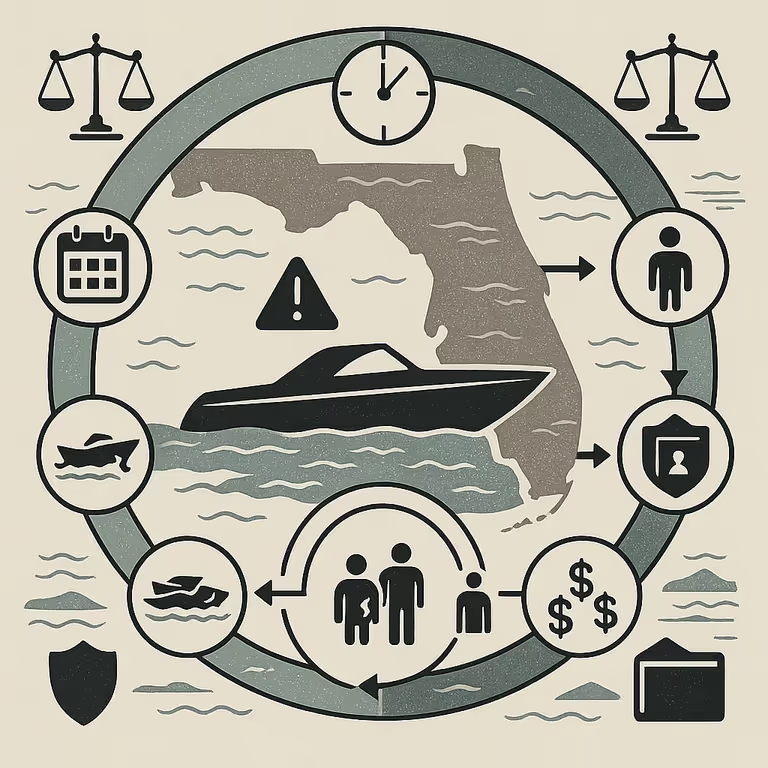How Long Do You Have to File a Police Report After an Accident in Florida?
Learn Florida's accident reporting deadlines, when to call 911, and the 10-day rule for crash reports. Protect your rights after a car accident.

- Call 911 immediately if there's any injury or property damage estimated at $500 or more.
- The 10-day filing deadline applies mainly when police don't respond to minor accidents.
- Proper reporting protects your legal rights and insurance interests long-term.
Worried About Your Injury Case? We'll Review It - Free!


Do I Need to Call Police After My Accident? (Immediate Decision Guide)
Your heart is racing, your hands are shaking, and you're asking yourself: "Do I need to call the police?" After a car accident, this decision feels overwhelming, but understanding Florida's requirements can help you make the right choice quickly.
Under Florida law, you must immediately call 911 if your accident involves any injury, death, or property damage estimated at $500 or more. This requirement comes from Florida Statute 316.065, and it's designed to ensure proper documentation and emergency response when needed.
Here's the reality about that $500 threshold: it happens faster than most people think. A minor bumper scrape, cracked headlight, or even paint transfer can easily reach $500 in today's vehicle repair costs. Modern cars have expensive sensors, cameras, and safety equipment built into bumpers and lights that weren't there years ago. What looks like a "fender bender" can quickly become a costly repair.
When in doubt, always call. It's far better to have police respond and determine no report is needed than to fail to report an accident that should have been documented. Law enforcement officers are trained to assess accident scenes and can help determine whether official documentation is necessary.
At Douglas R. Beam P.A., our experience handling thousands of car accident cases throughout Brevard County has shown us how proper initial reporting can make the difference between a straightforward insurance claim and a complicated legal battle. We've seen cases where clients who properly reported minor accidents were protected when the other driver later claimed more serious injuries or damage.
If you're unsure about the extent of damage or potential injuries, contact our Melbourne car accident lawyers for guidance on protecting your rights after an accident.

When Must You File a Written Report? (The 10-Day Rule Explained)
Many people confuse Florida's two separate reporting requirements: calling 911 at the scene versus filing written reports later. Understanding this distinction is crucial for compliance with state law.
The "10-day rule" under Florida Statute 316.066 primarily applies when police do NOT respond to the scene for minor accidents. This statute requires that when law enforcement doesn't investigate an accident, drivers involved may need to file a "Driver Report of Traffic Crash (Self Report)" with the Florida Department of Highway Safety and Motor Vehicles within ten days.
This typically happens in scenarios where:
- Property damage is minimal (under the $500 threshold)
- No injuries are apparent
- Police determine the accident doesn't warrant an official report
- The accident occurs on private property where police may not respond
However, if police DO respond to your accident and create an official crash report, drivers typically don't need to file separately. Law enforcement handles the formal reporting to FLHSMV as part of their standard procedure.
Important clarification: Not all accidents require the 10-day driver filing. This requirement only applies when police haven't already documented the incident. If an officer responds and tells you "no report will be filed," that's when you might need to consider the self-reporting option within ten days.
The key is understanding which situation applies to your specific accident. When police respond and document the scene, they handle the official reporting requirements. When they don't, the responsibility may fall to you.

How to File Your Crash Report in Florida (Step-by-Step Process)
This section applies when police didn't respond to your accident or told you they wouldn't be filing an official report. In these situations, Florida law may require you to file a Driver Report of Traffic Crash within ten days.
Step 1: Determine if You Need to File
You'll need to file if police didn't respond AND there was property damage or injury. Even minor damage may require reporting to protect your interests.
Step 2: Gather Required Information
Before filing, collect:
- Driver information for all parties (names, addresses, license numbers)
- Insurance company names and policy numbers
- Vehicle information (make, model, year, VIN if possible)
- Accident details (date, time, location, description of what happened)
- Witness contact information
- Photos of damage and the scene if available
Step 3: Obtain the Proper Form
The Florida Department of Highway Safety and Motor Vehicles provides the Driver Report of Traffic Crash form. This can typically be obtained online through the FLHSMV website or at local driver license offices.
Step 4: Complete and Submit
Fill out all required sections accurately and completely. Submit the form according to FLHSMV instructions, which may include mailing to a specific address or submitting through their online system.
Step 5: Keep Copies
Always retain copies of everything you submit for your records. These documents may be important for insurance claims or potential legal proceedings.
Important reminder: Insurance companies often have their own separate reporting requirements and deadlines. Don't confuse these with the legal requirements under Florida statute. Even if your insurance company doesn't require immediate reporting, you may still have legal obligations to the state.
For comprehensive guidance on protecting your rights after any accident, our Brevard County personal injury lawyers can help you understand both legal requirements and practical next steps.

What Happens If You Don't Report? (Consequences and Risks)
Failing to comply with Florida's accident reporting requirements can create serious problems that extend far beyond potential legal penalties. Understanding these consequences helps emphasize why proper reporting matters.
Legal Consequences
While specific penalties for non-compliance can vary, failing to report accidents as required by Florida Statutes 316.065 and 316.066 can result in citations and potential complications with your driving record. For detailed information about specific penalties in your situation, consult with a qualified attorney who can review the current statutes and any recent changes.
Insurance Implications
Insurance companies take reporting seriously. Failure to report an accident promptly can:
- Jeopardize your insurance coverage for the incident
- Provide grounds for your insurance company to deny your claim
- Complicate the claims process significantly
- Affect your ability to recover compensation for damages
Impact on Personal Injury Claims
If you're later injured or discover injuries after an accident, lack of proper initial documentation can severely impact your legal rights. Without official documentation, it becomes much harder to:
- Prove the accident occurred as described
- Establish fault and liability
- Connect injuries to the specific accident
- Recover fair compensation for medical expenses and other damages
Practical Problems
Beyond legal and insurance issues, failing to report creates practical difficulties:
- Evidence disappears and witnesses become unavailable
- The other driver's story may change over time
- Physical evidence at the scene is lost
- Vehicle damage becomes harder to conclusively link to the accident
At Douglas R. Beam P.A., we've seen how clients' rights can be compromised by improper initial reporting. Our decades of experience in Brevard County courts have shown us that thorough documentation from the beginning almost always leads to better outcomes for accident victims.
The bottom line: proper reporting protects your legal rights, insurance interests, and future options. For more information about how Florida's insurance laws affect accident victims, read our guide to Understanding Florida No-Fault Insurance.

Special Considerations for Melbourne and Brevard County Residents
Living in Melbourne and Brevard County means dealing with unique traffic patterns and local considerations that can affect your post-accident decisions. Understanding these local factors can help you better navigate the reporting process.
Melbourne's Vision Zero Initiative
Melbourne participates in Vision Zero, a traffic safety initiative designed to eliminate traffic fatalities and serious injuries. This program involves enhanced data collection and analysis of traffic crashes throughout the city. When you report an accident in Melbourne, your information becomes part of this comprehensive safety database, helping local officials identify dangerous intersections and implement improvements.
This local focus on traffic safety data means Melbourne residents benefit from more detailed analysis of crash patterns, but it also emphasizes the importance of accurate, complete reporting when accidents occur.
Local Traffic Challenges
Melbourne residents face specific traffic challenges that increase accident risk:
- Heavy tourist traffic, especially during peak seasons
- Complex intersections along major corridors like US-1 and West New Haven Avenue
- Mixed local and tourist drivers unfamiliar with area roads
- Construction zones that frequently change traffic patterns
These factors mean accidents in our area often involve out-of-state drivers or complex scenarios that make proper documentation even more crucial.
Local Law Enforcement Procedures
Brevard County and Melbourne police departments follow state requirements but may have specific local procedures for accident response and reporting. Understanding that local officers are familiar with high-accident areas and common local scenarios can be helpful when they're assessing your accident scene.
Why Local Legal Experience Matters
Douglas R. Beam P.A. has been serving Melbourne and Brevard County since 1988, giving us intimate knowledge of local court procedures, law enforcement practices, and the unique challenges our community faces. Our experience with over $1 billion in verdicts and settlements includes deep understanding of how local factors affect accident cases.
When you work with our firm, you benefit from Doug Beam's nearly four decades of experience practicing law in this community, including his understanding of local reporting procedures, court systems, and the specific challenges Melbourne residents face after accidents.
Frequently Asked Questions
Do I need to call police for a minor fender-bender?
Yes, if there's any possibility of injury or if you estimate property damage at $500 or more. Modern vehicle repairs are expensive, and what appears minor can quickly exceed the $500 threshold. Sensors, cameras, and safety equipment built into today's bumpers and lights make even small impacts costly to repair. When in doubt, it's always better to call and let officers determine if a report is needed.
What if the other driver doesn't want to call police?
You have an independent right and legal obligation to report the accident according to Florida law, regardless of what the other driver prefers. If the accident meets the criteria requiring police notification (injury, death, or $500+ property damage), you should call 911. The other driver's wishes don't override your legal requirements or your right to protect yourself through proper documentation.
How long do I have to file my own crash report?
If you need to file a Driver Report of Traffic Crash (which applies when police don't respond or file a report), Florida law allows ten days from the date of the accident. However, it's best to file as soon as possible while details are fresh in your memory and evidence is still available.
Understanding Florida's accident reporting requirements protects both your immediate interests and your long-term legal rights. Acting quickly and properly after any accident ensures you comply with the law while preserving your options for the future.
If you've been in an accident in Melbourne or Brevard County, contact Douglas R. Beam, P.A. for a free consultation about your rights and options. Our experienced team understands local procedures and can help guide you through the complex process of protecting your interests after an accident. Call us today at (321) 723-6591 to speak with our legal team about your specific situation.
This article provides general information and is not a substitute for legal advice. Laws can change, and the details of your situation matter. For personalized guidance, please contact a qualified Florida personal injury attorney.
Not Sure What To Do Next? We Can Help – Fast & Free.
Worried About Your Injury Case?
We'll Review It - Free
Don’t miss an article
Florida law, local insights, and the occasional dog pic.
Delivered straight to your inbox.
More articles
Browse all articlesFree Case Review
Get a complimentary review of your case

.webp)


.png)
.png)
.png)
.png)

